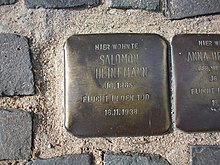Salomon Heinemann
Salomon Heinemann (born January 26, 1865 in Essen , † November 18, 1938 ibid) was a German lawyer and judicial councilor in Essen.
Family and work


As the third of four children of the Jewish manufactured goods dealer Hermann Heinemann (* June 25, 1822, † February 6, 1894) and his wife Amalie geb. Cohen (born March 15, 1833; † April 18, 1891) Salomon Heinemann was born in Essen in 1865. Salomon Heinemann attended the Burggymnasium in the city center of Essen and graduated from high school at Easter 1885. This was followed up in 1890 to study law , which he in the April 22, 1885 , Heidelberg had begun. He completed the second semester in Leipzig , the third and fourth in Berlin and the fifth in Göttingen . A time as a court assessor in Bielefeld followed .
In March 1893 he became engaged to the author and poet Anna Wertheimer , who also had contacts in legal circles. After April 13, 1893 in Leipzig for Dr. jur. doctorate and the Essen District Court as a lawyer had been admitted, they were married on March 11, 1894 in Bielefeld. His mother had died in 1891 and his father did not live to see the wedding either. The marriage remained childless. He and his wife moved into their now vacant parental home at Street II. Hagen 25 in the center of Essen, where they lived until at least 1908. They then lived in the house at Haumannplatz 1 in Essen- Rüttenscheid , which was newly built around 1910 and which was designed by the architect Paul Schultze-Naumburg . It was later destroyed in World War II.
Salomon Heinemann established himself there as a lawyer and notary . His office was not far from the office and residential building that he built between 1913 and 1914 and is now a listed building at Zweigertstrasse 50. Heinemann was awarded the honorary title of Counselor in 1913 and, in addition to private individuals, represented the Rheinisch-Westfälische Kohlen-Syndikat (RWKS ) as well as other important companies and institutions in the Ruhr area .
Heinemann was also an important promoter of culture and a founding member of the board of the Folkwang Museum Association for many years . He bequeathed his private collection of expressionist paintings to his hometown Essen in a will. He also owned a larger library. In addition, he was temporarily a member of the board of the Essen Music Association. As a member of the synagogue community, he was considered a patron of the Old Synagogue in Essen, but at the same time renounced Jewish customs.
Persecution and suicide
In several verses of his wife Anna there are premonitions and fears about the future; nevertheless they made no attempt to emigrate during the Nazi era . After the seizure of power , as a Jew, he had to give up his professional activity including all mandates and functions in 1933. As a result of this quick resignation, Heinemann initially remained undisturbed by the National Socialists than his approximately 20 Jewish colleagues in Essen. The law firm was founded by its employees, the baptized nephew Dr. Aschaffenburg and the non-Jewish Dr. Witte continued until 1938. However, their notary's office had already been withdrawn in September 1935. On the night of the November pogroms from November 9th to 10th, 1938, the entire facility in their shared house on Haumannplatz was devastated and set on fire, and his art collection, valued at 40,000 Reichsmarks, was destroyed. One of the two former housemaids accommodated the couple outside Essen. A little later, on November 14th of that year, the couple returned to Haumannplatz and committed suicide there . Salomon Heinemann died four days later, also four days after his wife, in the Huyssensstift hospital of the consequences of light gas poisoning .
Salomon Heinemann and his wife Anna were buried in the Jewish cemetery in Essen- Segeroth , where his parents are also buried.
Two stumbling blocks in front of the office building at Zweigertstrasse 50 in Essen remember Salomon and Anna Heinemann .
literature
- Erwin Dickhoff: Essen heads . Ed .: City of Essen - Historical Association for City and Monastery of Essen. Klartext-Verlag, Essen 2015, ISBN 978-3-8375-1231-1 .
- Regional court Essen (ed.): In memory of Jewish lawyers in Essen . Essen 2001, p. 28 .
Web links
- Detailed biography of the Heinemann couple at the Leo Baeck Archive, New York, digital full text (PDF)
- Stumbling blocks Heinemann on www.waymarking.com
- Short biography of Salomon Heinemann (PDF) on media.essen.de
Individual evidence
- ↑ a b The gravestones of the Heinemann family in the Jewish cemetery in Essen-Segeroth at www.steinheim-institut.de; accessed on January 17, 2020
- ^ Anna Heinemann (née Wertheimer, 1869–1938) on Jewish writers in Westphalia ; accessed on January 17, 2020
- ↑ Speech by the Mayor of Essen commemorating the “Reichspogromnacht” on November 9, 2014 in the Old Synagogue Essen (PDF) on media.essen.de; accessed on January 17, 2020
| personal data | |
|---|---|
| SURNAME | Heinemann, Salomon |
| BRIEF DESCRIPTION | German lawyer and judicial councilor in Essen |
| DATE OF BIRTH | January 26, 1865 |
| PLACE OF BIRTH | eat |
| DATE OF DEATH | November 18, 1938 |
| Place of death | eat |
